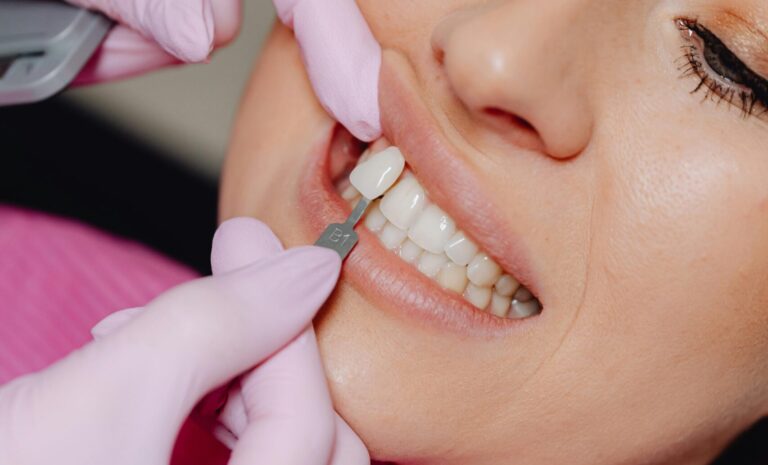What are Dental Veneers and How Can They Improve Your Smile?
What are Dental Veneers?
Dental veneers are custom-made, wafer-thin shells that cover the front surface of teeth to improve their appearance. They are typically made from either porcelain or composite resin materials.
Porcelain veneers are known for their durability and stain resistance, offering a natural look that closely resembles real teeth.
Composite resin veneers are more affordable and can be applied in a single visit, but they are less durable and more prone to staining compared to porcelain.
Veneers can address a variety of dental issues, including:
- Discoloration: Stains that do not respond to whitening treatments.
- Chipped or broken teeth: Restoring the appearance and function of damaged teeth.
- Gaps: Closing small spaces between teeth.
- Misalignment: Creating the illusion of perfectly aligned teeth.
The Procedure for Getting Dental Veneers
Initial Consultation and Examination
The journey to getting dental veneers begins with an initial consultation with your dentist. During this visit, your dentist will assess your oral health, discuss your cosmetic goals, and determine if veneers are the right solution for you. This step may include X-rays and taking impressions of your teeth.
Preparing the Teeth
Once you’ve decided to proceed with veneers, the next step involves preparing your teeth. This typically includes removing a small amount of enamel from the front surface of your teeth to create room for the veneers. This process ensures that the veneers will sit flush with your natural teeth and provide a seamless look.
Taking Impressions and Creating Custom Veneers
After the enamel removal, your dentist will take impressions of your teeth. These impressions are sent to a dental laboratory where your custom veneers will be crafted. The process of creating veneers usually takes one to two weeks. In the meantime, your dentist may place temporary veneers to protect your prepared teeth.
Placing the Veneers
Once your custom veneers are ready, your dentist will check their fit, shape, and color, making any necessary adjustments. The veneers are then bonded to your teeth using a special adhesive. A light beam is used to harden the adhesive quickly, securing the veneers in place. You may need a follow-up visit to ensure that your gums are responding well to the new veneers and to make any final adjustments.
Types of Dental Veneers
| Feature | Porcelain Veneers | Composite Resin Veneers |
|---|---|---|
| Durability | Highly durable, can last 10-15 years | Less durable, typically last 5-7 years |
| Appearance | Natural and translucent | Can be matched to natural tooth color |
| Stain Resistance | Highly resistant to stains | Prone to staining over time |
| Application | Requires multiple visits | Usually completed in one visit |
| Cost | More expensive | Generally more affordable |
No-prep veneers: These require minimal to no enamel removal, preserving more of your natural tooth structure. They are less invasive but may not be suitable for all cosmetic issues.
Benefits of Dental Veneers
Cosmetic Benefits
Improved appearance: Veneers can significantly enhance the look of your teeth by correcting discoloration, shape, and alignment issues.
Natural look: Porcelain veneers, in particular, mimic the light-reflecting properties of natural teeth, providing a realistic appearance.
Functional Benefits
Strengthened teeth: Veneers can add a layer of protection to damaged teeth, potentially preventing further wear and tear.
Stain resistance: Porcelain veneers resist stains better than natural teeth and composite resin, helping maintain a bright smile.
Psychological Benefits
Increased confidence: A beautiful smile can boost your self-esteem and confidence.
Improved self-esteem: Feeling good about your smile can enhance your overall sense of well-being.
- Enhanced appearance
- Natural-looking results
- Strengthened teeth
- Stain resistance
- Increased confidence
- Improved self-esteem
Caring for Your Dental Veneers
To ensure the longevity and appearance of your dental veneers, follow these care tips:
- Maintain good oral hygiene: Brush and floss regularly to keep your teeth and gums healthy.
- Avoid certain foods: Limit consumption of staining foods and beverages like coffee, tea, and red wine. Avoid biting into hard objects that could damage the veneers.
- Regular dental check-ups: Visit your dentist regularly for cleanings and check-ups to monitor the condition of your veneers.
- Use a non-abrasive toothpaste: Opt for a toothpaste that is gentle on your veneers to prevent scratching and dulling.
Porcelain veneers typically last between 10-15 years with proper care, while composite resin veneers last around 5-7 years. Following these maintenance tips can help prolong their durability and keep your smile looking its best.
Transform Your Smile with Dental Veneers
Dental veneers offer a versatile and effective solution for enhancing your smile. They address a variety of cosmetic concerns, from discoloration to misalignment, providing both aesthetic and functional benefits. By understanding what dental veneers are, the procedure involved, the different types available, and how to care for them, you can make an informed decision about whether veneers are the right option for you. Consult with your dentist to explore how dental veneers can help you achieve the smile you’ve always desired.

